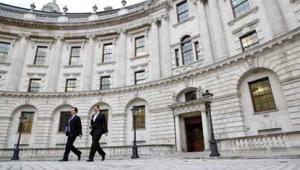By Vivienne Russell
25 October 2010
Prime Minister David Cameron today launched the government’s National Infrastructure Plan, which sets out the country’s infrastructure priorities and the scale of investment needed to meet them.
The plan, the first of its kind, brings together policies on planning, energy, transport and digital communications from across Whitehall and distils them into a single document.
It sets out the government’s intention to unlock £200bn of public and private sector funding over the next five years to support infrastructure and underpin growth. The majority of the funding will be focused on transport and energy projects and will be released through ‘smarter’ use of public funding and the encouragement of new sources of private capital, the prime minister said.
‘We are targeting government’s own investment at a series of bold and critical projects that go to the heart of this vision and support a private sector-led recovery,’ he said.
Also included in the plan is the Localism Bill, due to be published next month, which will radically overhaul the planning system, and the commitment for a local growth white paper to be published by the end of the year.
Launching the plan at the CBI conference in London, Cameron said it would ‘completely update and modernise our infrastructure’. He added: ‘In the Budget, you saw the first parts of this plan, as we did not reduce capital spending compared to the last government’s figures.
‘Last week, in the Spending Review, we went further and announced an additional £8.6bn over the next four years for capital spending. Indeed, even in these constrained times, we will invest over £30bn in transport projects over the next fours years – which is more than was invested during the past four years.’
Paul Skinner, chair of Infrastructure UK, said the body would play an active role in putting the plan into effect.
‘This initial phase of Infrastructure UK’s work has validated the proposition that infrastructure development can be an important driver of the UK’s future growth and competitiveness and that there is real value in taking an integrated, cross-sector approach,’ he said.
Cameron also today announced a £200m investment in Technology and Innovation Centres, which will act as bridge between universities and businesses.
‘They won’t just carry out their own in-house research, they will spread knowledge too, connecting businesses – large and small, new and old – to potential new technologies, making them aware of funding streams and providing access to skills and equipment,’ he said.
But this move was slammed by the University and College Union. General secretary Sally Hunt said: ‘It is typical of the inverted logic of the coalition government that less than a week after slashing £2.9bn off university budgets, it acknowledges that higher education has a key role in generating innovation and economic growth.
‘If there is to be a proper relationship between universities and business, then big business needs to start paying its fair share – they’ve had a free ride for far too long. If the government really wants true collaboration between universities and business it should reverse the cuts and ensure business finally contributes to our universities through a business education tax.’



















